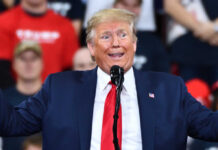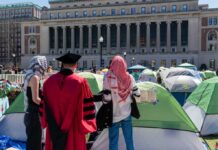
Republican presidential candidate Vivek Ramaswamy criticized others in the GOP field for not committing to remove themselves from the Colorado primary after that state’s supreme court removed former President Trump from the ballot. The businessman questioned the court ruling ahead of the first nominating contests starting next month.
Ramaswamy said that the other GOP candidates made an error in not promising to remove themselves from Colorado’s primary following the court decision.
He argued that the Colorado Supreme Court decision was an “unconstitutional and flagrant violation of the way we conduct elections in this country, Maria. This is not the way we do things in the United States of America. ‘We the people’ are the ones who select our leaders, not unelected cabals of Democrat judges and back offices.”
Ramaswamy told Fox News that his promise occurred “to protect the constitutional republic, and that’s the first principle we have to stand for above all.”
Vivek Ramaswamy on why he pledged to withdraw from the Colorado GOP primary unless Trump is allowed on the ballot:
"What are we winning for? It's to protect the constitutional republic, and that's the first principle we have to stand for above all." pic.twitter.com/ok3xeASAPt
— The Post Millennial (@TPostMillennial) December 24, 2023
He added that hs promise was “very practical.”
“If every Republican in the Colorado GOP primary also says ‘we’re not participating,’ then this blatant act of election interference has no impact,” he said.
The candidate added that he wanted to “lead by example” and called for candidates such as Florida Gov. Ron DeSantis (R) and former South Carolina Gov. Nikki Haley (R) to follow.
Despite this, Ramaswamy said that he was “disappointed to hear radio silence or worse from those other candidates who said they wanted to collect their delegates.”
Earlier this month, the Centennial State’s high court made the split decision, arguing that the former president engaged in an insurrection as part of the Jan. 6, 2021 protests at the Capitol.
The court argued that the former president’s disqualification was legal under a clause in the 14th Amendment, which bars individuals from serving in the federal government if they engaged in an ‘insurrection.’
Despite the court’s decision, the case will likely be ultimately decided by the United States Supreme Court early next year.














